El efecto Mariel: Before, During, and After
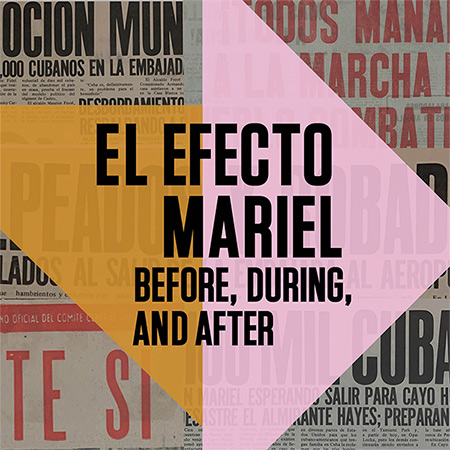
El efecto Mariel: Before, During, and After, is a year-long, multi-prong program comprising a series of webinars, as well as live film streamings, informal talks, oral histories, and exhibition projects organized by the Cuban Heritage Collection at the University of Miami Libraries. The program takes an interdisciplinary approach to studying anew the antecedents, unfolding, and aftermath of the Mariel boatlift of 1980 upon its 40th anniversary. By bringing together multiple perspectives on this historic event, the series aims to frame Mariel, not in the past, but in the present, underscoring its enduring relevance and legacies.
The arrival of over 125,000 Cubans to the coasts of South Florida in the span of a few months in 1980 had long-lasting social, racial, economic, and cultural consequences in Miami and beyond. Among the central topics addressed throughout this series are the historical and political factors from the late 1970s-both in Cuba and in the exile community-that led to this unprecedented refugee crisis, the Cuban exile community’s response to this new influx of Cuban refugees, the social and racial tensions that ensued in South Florida in the wake of the boatlift, Mariel’s impact on immigration policies, the role of the media in covering Mariel, and the significant impact of the Mariel generation in Cuban diasporic cultural production.
To learn more about the history and legacy of the Mariel Boatlift, visit our Research Guide.
Call for Submissions
Contribute to a special edition of Anthurium: A Caribbean Studies Journal – Mariel @ 40, November 2021
Submissions may include scholarly essays, research articles, personal narratives, creative writing, interviews, and oral histories or commentaries. Digital Humanities and/or web-based publications/projects are welcomed. Submissions should focus on any aspect of the Mariel Boatlift’s impact on the communities of Greater Cuba.
Deadline for submissions: January 15, 2021 (CLOSED)
For more information, please review the Call for Papers or contact Lillian Manzor at lmanzor@miami.edu or Mike Bustamante at mbustama@fiu.edu
Webinar Series – Past Events
Diplomacia por la Libertad: Embajador Ernesto Pinto Bazurco-Ritler en conversación con Leticia Callava
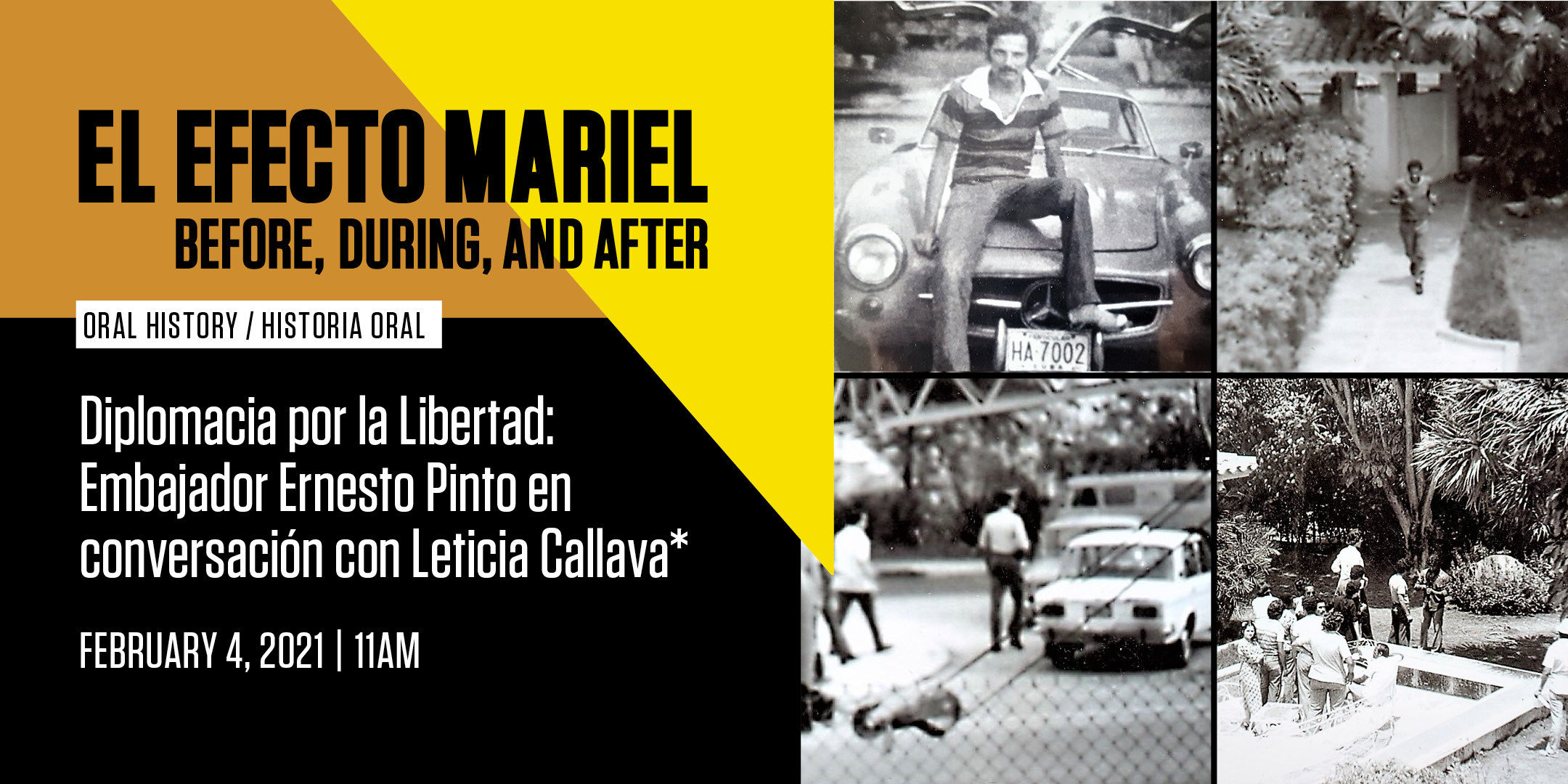
Durante los primeros días del mes de abril de 1980, más de 10,000 cubanos irrumpieron en el recinto de la Embajada de Perú en La Habana buscando asilo político, eventualmente desatando el éxodo masivo por el puerto del Mariel de más de 125,000 migrantes cubanos a las costas del sur de la Florida. En el centro de estos dramáticos hechos surgió una figura clave, el embajador Ernesto Pinto-Bazurco Ritter, entonces enviado diplomático en La Habana para el gobierno peruano.
Esta es una oportunidad única de escuchar los relatos de primera mano del Embajador sobre los eventos que llevaron a la crisis, así como los detalles sobre sus negociaciones con Fidel Castro, la administración Carter y el gobierno peruano durante los días y semanas que siguieron. También aprenderemos cómo esta experiencia impactó la carrera diplomática del Embajador Pinto, así como su vida personal.
During the first days of the month in April of 1980, over 10,000 Cubans stormed the compound of the Peruvian Embassy in Havana seeking political asylum, unleashing what would become known as the Mariel Boatlift—the massive exodus of over 125,000 Cuban migrants from the port of Mariel to the shores of South Florida. At the center of these dramatic events emerged a key figure—Ambassador Ernesto Pinto-Bazurco Ritter—then diplomatic envoy in Havana for the Peruvian government.
This is a unique opportunity to hear a first-hand account from the Ambassador of the events leading up to the crisis, as well as the details about his negotiations with Fidel Castro, the Carter administration, and the Peruvian government during the days and weeks that followed. We will also learn about how this experience impacted Ambassador Pinto’s career as a diplomat, as well as his personal life.
Pluma y Plumero: Palabras y Papeles de Reinaldo Arenas presentado por René Cifuentes
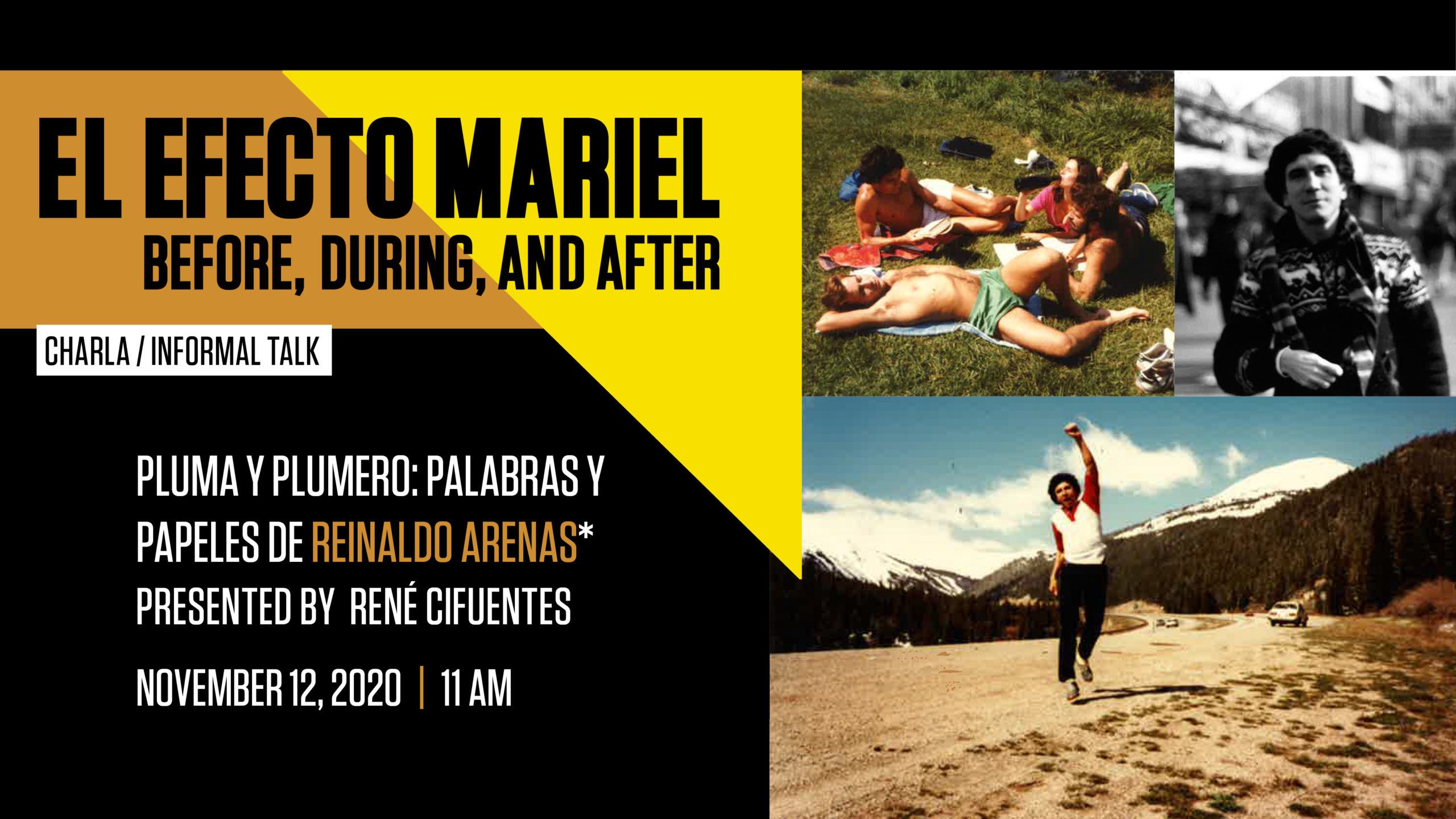
Desde su llegada a Nueva York como refugiados en 1980, Reinaldo Arenas y René Cifuentes formaron una íntima y jocosa amistad que duraría hasta los últimos años del escritor, con el cual colaboraría en diferentes proyectos, incluyendo la fundación de la revista Mariel. En su charla, Cifuentes intenta explicar esta amistad, plenamente documentada con fotos, grabaciones de llamadas telefónicas, notas y postales, ahora depositadas en la Cuban Heritage Collection (Colección de la Herencia Cuba), para conmemorar el 40 aniversario del éxodo de Mariel y los 30 años de la desaparición de Reinaldo Arenas.
Upon their arrival as refugees in New York in 1980, Reinaldo Arenas and René Cifuentes formed an intimate and playful friendship that would last through the writer’s final years. During that time, the two collaborated on multiple projects, including founding Mariel magazine. In his talk, Cifuentes attempts to explain this friendship, which is expansively documented with photos, telephone recordings, notes and postcards, now in the Cuban Heritage Collection, in commemoration of the 40th anniversary of the Mariel exodus and the 30 years since the loss of Reinaldo Arenas.
The Mariel Effect: Social and Racial Tensions in South Florida in the Wake of the Boatlift
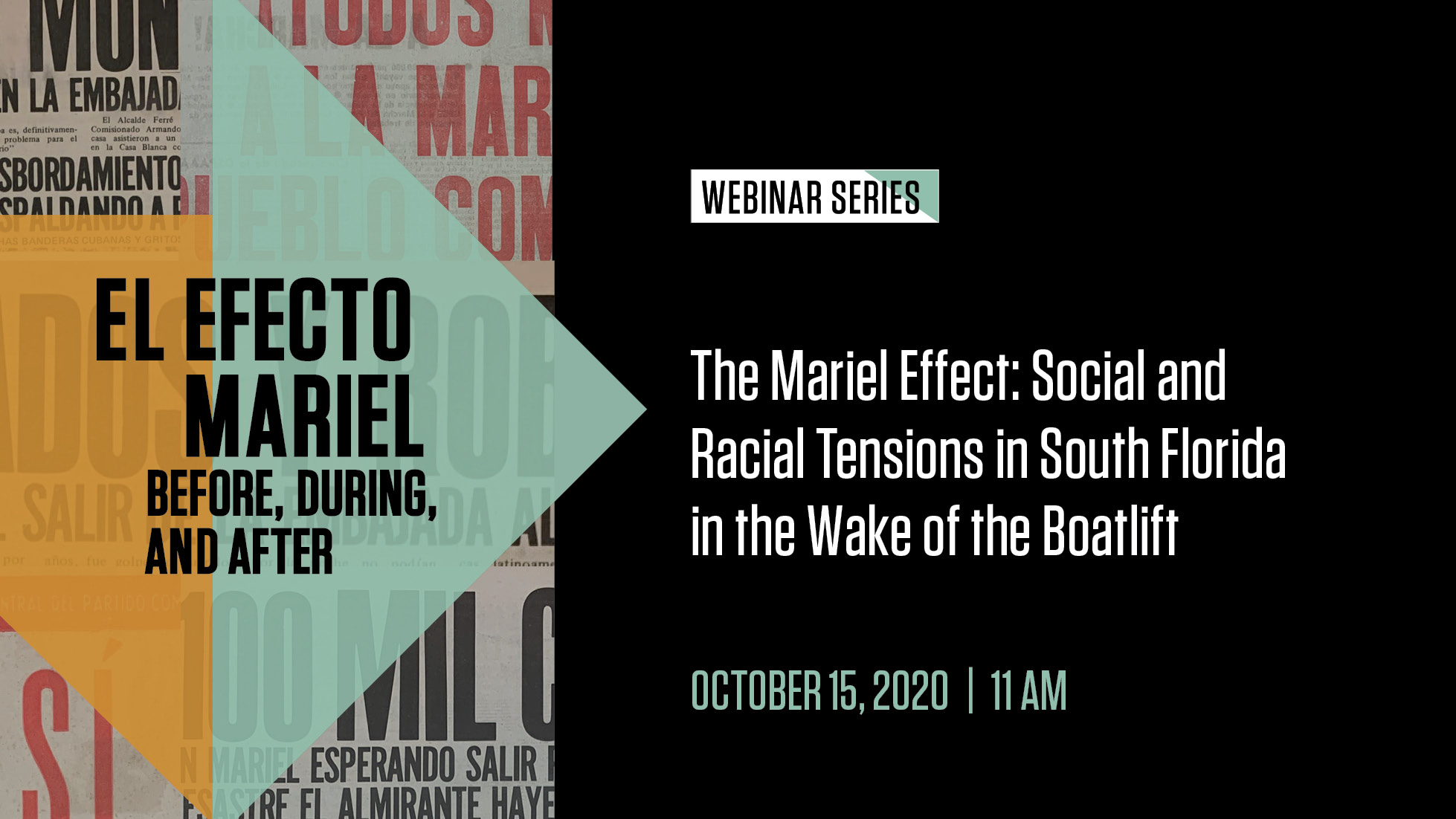
The arrival of 125,000 Cubans from the Port of Mariel to South Florida beginning in April 1980 coincided with a particularly volatile period in Miami. The killing of Arthur McDuffie—an unarmed Black man—by White and Latino police officers who were later acquitted, exacerbated deeply rooted tensions in race relations among African Americans, Whites, and Latinos (primarily Cubans) in Miami. At the same time, the new influx of Cuban refugees was associated with another crisis: the HIV/AIDS epidemic. Three distinct voices representing recent scholarship will address the complicated ways in which issues around race and gender played out post-Mariel during the 1980s and continue to shape Miami today.
The Exile Community Responds: Solidarity and Stigmatization
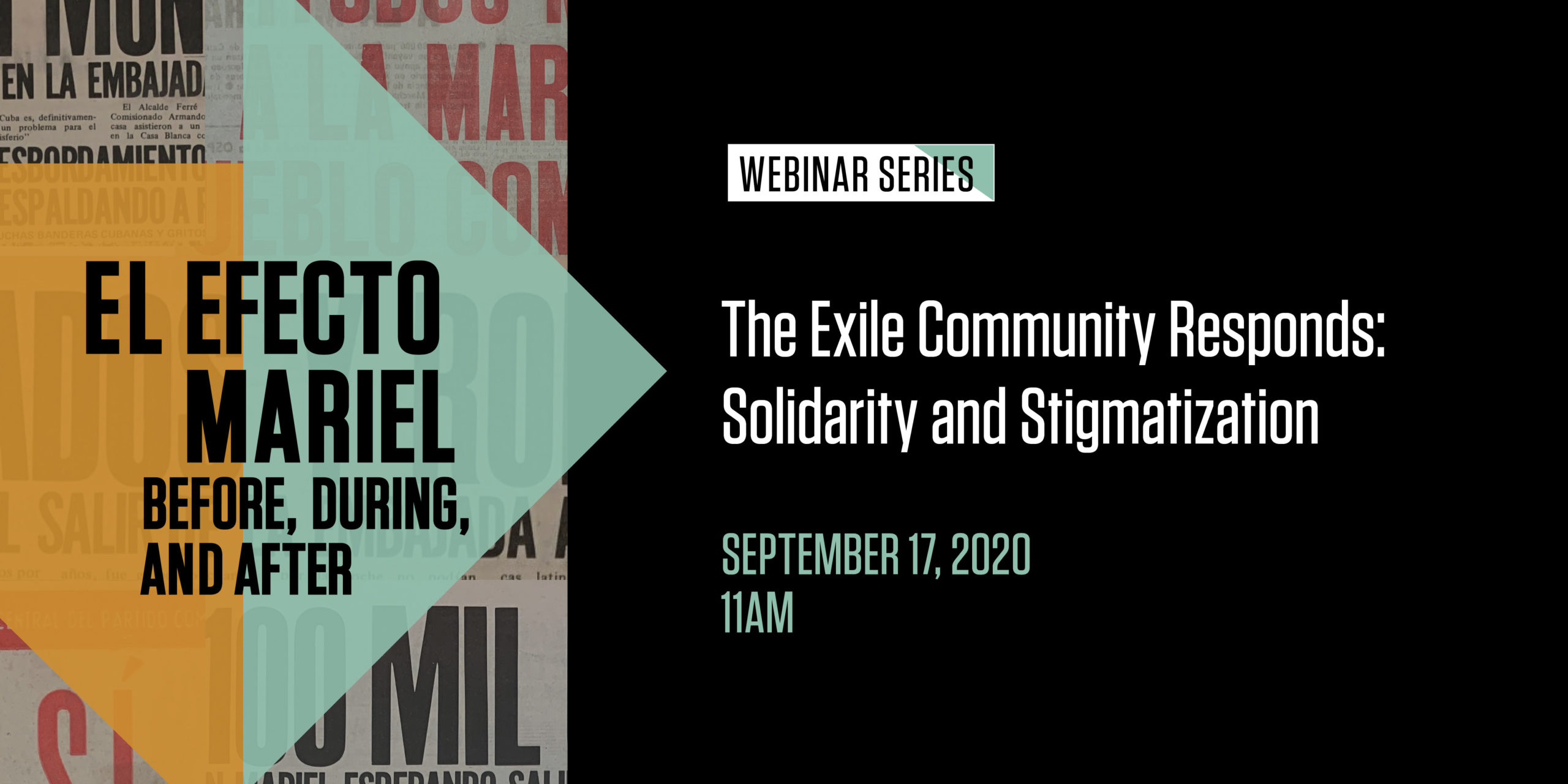
By 1980, Miami’s Cuban community, made up of refugees and exiles who arrived in South Florida in the 1960s and early 1970s, had begun to garner significant economic and political power locally. These early Cuban immigrants—many of whom are informally known today as el exilio histórico, or the historic exile community—were in many ways a monolithic group, i.e. mostly white, Catholic, socially and politically conservative, and hailing from the island’s pre-revolutionary professional and middle classes. That demographic and cultural picture changed considerably when beginning in April of 1980, and over the span of only a few months, more than 125,000 new refugees arrived on the shores of South Florida after fleeing the island via the Port of Mariel.
How did the established Cuban community in Miami respond to this new influx of Cuban refugees who were more racially and culturally diverse, and whose experiences on the island were in many ways quite different? This panel explores how the newly arrived Cubans (Marielitos) were greeted with an outpouring of support, on the one hand, and increasingly with deep suspicions (especially along lines of class and race), on the other. Panelists will further explore how Mariel migrants settling in Miami added new complications to the city’s already fraught inter- and intra-ethnic dynamics. For that reason, the story of their early reception in the United States, like the story of their migration as a whole, is arguably one that resists easy moral lessons.
The Boatlift Unfolds: Perspectives from Both Sides of the Florida Straits
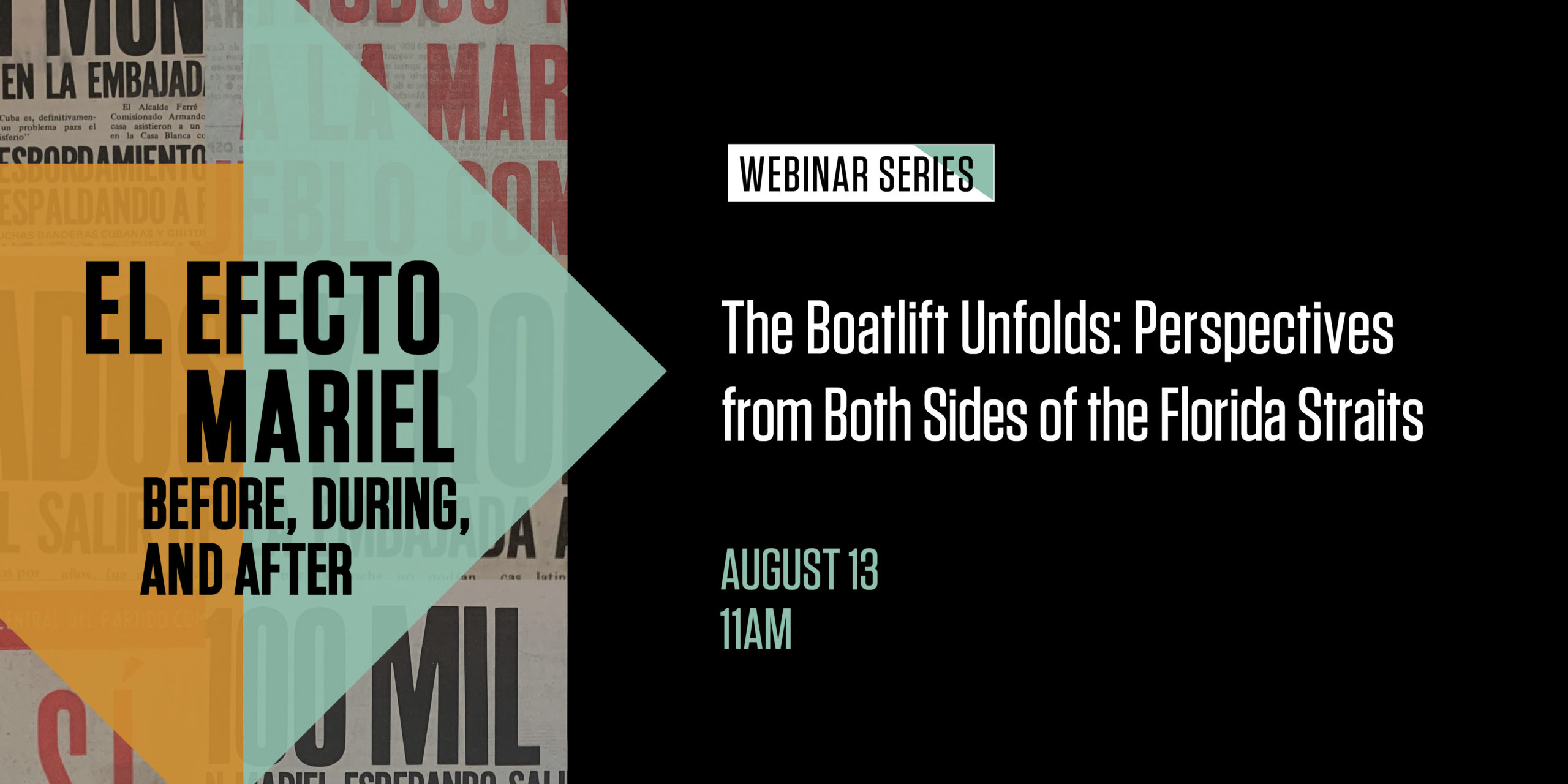
The Boatlift Unfolds: Perspectives from Both Sides of the Florida Straits, the second in our series of webinars and virtual programs addressing the antecedents, unfolding, and aftermath of the 1980 Mariel boatlift. In this event, panelists will offer unique perspectives on the unfolding of the Mariel crisis itself—from its beginnings at the Peruvian embassy in Havana, to the arrival and detention of many Mariel migrants on far flung military bases across the United States. We will also hear detailed accounts of the mass rallies and “acts of repudiation” carried out in Cuba to denounce those choosing to depart, and we will explore how race and racism fed into these practices of internal stigmatization. Ironically, the denigration of Mariel migrants in Cuba would mirror the ways some would see and treat them in the United States.
Antecedents to the Mariel Boatlift in Cuba and Cuban-America
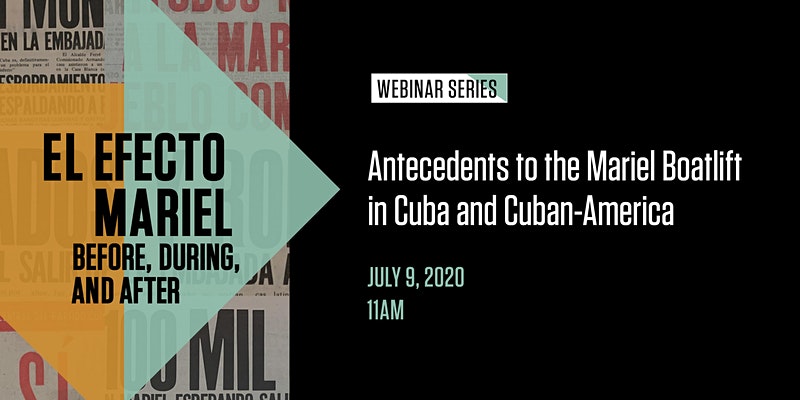
Antecedents to the Mariel Boatlift in Cuba and Cuban America launches a yearlong Mariel program, El efecto Mariel: Before, During, and After, and inaugurates the CHC’s first webinar series. In this program, panelists will examine the historical, ideological, economic, socio-cultural, political, as well as personal factors that framed the 1970s, both in Cuba and in the Cuban exile community, leading up to the boatlift in 1980.
Share your Mariel Story!
About Mariel Stories: Members of the community are encouraged to share their personal memories, stories, and reflections related to the Mariel boatlift of 1980. Stories will be collected virtually on a rolling basis and a series of prompts give participants ideas from where they can begin their story. Submitted stories will become part of the permanent collections of the Cuban Heritage Collection and the HistoryMiami Museum and featured on both online platforms.
- How has Mariel impacted you?
- Do you have a personal story related to Mariel?
- What are some of the misconceptions about Mariel that you have noticed?
- What are some of the lasting legacies of Mariel?
- How has Miami or the area where you live been impacted by Mariel?
Click here to submit a written story.
Click here to submit a video story.
Our partners
![]()
